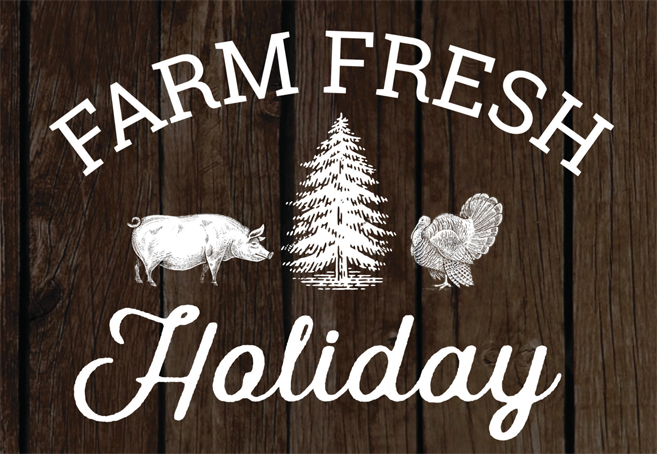Farm Fresh Holiday
TURKEY FARM
WORDS BY SAMANTHA CONNORS
For nearly a century, the same family has tended the land at Keegan-Filion Farm in Walterboro, South Carolina, producing everything over the years from corn to peanuts, and beef to laying hens. In 1986, it was passed down to Annie, the great-granddaughter of the original owners, and her husband, Marc Filion, who now use the farm to raise chickens, turkeys and hogs, as well as grass-fed cattle.
Raised free range, all the animals on the farm roam as they please, feeding off the surrounding pastures. Choosing not to pump them with hormones and unnecessary antibiotics, Annie and Marc place high importance on humane treatment of the animals. “Our farm techniques are primarily geared towards their comfort and allowing them to express their natural tendencies,” says Marc Filion. “We want chickens and turkeys to eat grass and bugs. We want hogs to make wallows and root around in the field. All of this plays a big role in the quality, flavor and texture of our products.”
Though Filion notes that their meats are more expensive than those found at the grocery store—due to the higher cost of raising animals sustainably and humanely—the benefits are well worth the price. “Most animals are now raised in a factory setting with chickens, turkeys and hogs held in confinement housing where they are not able to see the light of day and are subjected to living conditions that most of us find totally unacceptable,” he says. The stress of this environment plus the unsanitary conditions—leading to an overuse of antibiotics—greatly lowers the animals’ quality of life, which also results in lower quality meat.
“Farming as most people remember it is gone,” he says. But thankfully farmers like the Filions are still dedicated to traditional techniques, caring for the animals and producing great products. Customers can experience Keegan-Filion Farm– raised meats by dining at restaurants throughout the Charleston, Beaufort and Columbia areas or by heading to the farmers’ markets in Summerville and Port Royal. The Filions also sell meat directly from the farm, which offers a home delivery service.
This holiday, help support our state’s farmers and order a Thanksgiving turkey directly from Keegan-Filion for a guaranteed quality meat. “The local market is the only place we can sell our products,” Filion says. “Without the support of the local area, farms like ours would close down.”
PIG FARM
WORDS BY HELEN DENNIS
In a state where much of the land still supports farmers and their families, opportunities to eat close to home during the holiday season are all around. Though markets full of fresh vegetables may come to mind, buying locally sourced pork is another way to support South Carolina farmers this season.
In addition to the economic impact of shopping locally, supporting a local pig farmer allows for transparency in the farming process. While large corporate farms across the country produce higher quantities of meat at lower standards, farmer Russell Singleton of Sunny Cedars Farm cares for his heritage-breed pigs in a different environment. On his farm in Sumter, South Carolina, pigs have a chance to grow slowly and naturally without the forceful push of growth hormones. They do not live a life of overcrowding or unnecessary stress.
“Know your farmer, know your food,” Singleton says. “We don’t use pesticides or growth promoters. Our animals are raised and processed in a humane environment. That is a message we promote all year long.”
And there’s a passion in this process. The Singleton family has lived on their farm for almost 20 years and Singleton is quick to share that he loves his job.
“It’s the most hours with the least pay I’ve ever done, but by far this is the most I’ve ever enjoyed a job,” he says. The job doesn’t come without hard work and support from his family and his community. The meat grown at Sunny Cedars Farms is sold at farmers’ markets around South Carolina and on their farm. Growing pigs in what Singleton calls the “old-fashion way” is worthy of that work. Local meat farms like his support a farming practice that is kinder to animals and kinder to the land. In this holiday season, our Southern kindness can certainly be extended to the animals and the land that feed us.
TREE FARM
WORDS BY HELEN DENNIS
Before they stand tall, covered in homemade ornaments and surrounded by brightly wrapped gifts, and even before they are secured to the roof of the family car with twine and a prayer, Christmas trees grow slowly and steadily in fields across rural South Carolina.
Though our state is better known for a more tropical tree, South Carolina Christmas tree farms can be found from Seneca to Sumter. While South Carolina is not likely to get that postcard-perfect, snow-dusted tree hunting experience, the Christmas tree farms around the state cultivate the warm Southern tradition of connecting with the land on which we live.
Agriculture makes up a large portion of the state’s economy, but the work can be isolating. All too often the importance of supporting local farmers gets lost somewhere between the field and the home.
South Carolina’s agriculture and tourism businesses work together in agritourism to draw people to the fields and introduce them to the farmers who earn their livings on the land. Agritourism operates year-round but in seasonal shifts. U-Pick berries pop up in the spring, and corn mazes in the fall. Christmas tree farms comprise the winter chapter of the story. In addition to contributing to the local culture and economy, the fields of Fraser Firs and Eastern Red Cedars are much better for the environment than artificial Christmas trees that pose an increasing threat to the success of Christmas tree farms and South Carolina farmers. According to the South Carolina Christmas Tree Association, artificial trees only last about six years. After that point, they are disposed of in landfills. Meanwhile, the more natural choose-and-cut Christmas tree farms act as a natural air filter, improving air quality and reducing pollutants. There are more than 40 members of the South Carolina Christmas Tree Association, each in the business of fresh trees, sustainable practices and a family experience.
For my family, Thanksgiving weekend was incomplete without a visit to Wright’s Tree Farm in Ward, South Carolina. Aunts, uncles and cousins were packed into a fleet of station wagons for a trip to the farm. The mild winters of South Carolina made post- Thanksgiving visits to the Christmas tree farm a pleasant stroll through a neatly planted forest. A day of bumpy haybale rides and cups of warm cider ends with trees tied to the top of cars making their way to homes across the state. Above all, South Carolina’s family-owned-and-operated Christmas tree farms provide the chance to ground ourselves during this busy time of year. Escape from the busy Christmas shopping and traffic, and pull away from the endless stream of holiday sale emails. Being together as a family to support local farms and collectively choosing a centerpiece to define the next month of joy and gathering is truly one of the best ways to start the holiday season.
Midlands Farms:
Hollow Creek Tree Farm, Gilbert in Midlands
Wright’s Tree Farm, Ward
Price’s Christmas Tree Farm, Lexington
Lowcountry Farms:
Booth’s Christmas Tree Farm, Conway
Lebanon Christmas Tree Farm, Ridgeville





